Suivi et évaluation
La plupart des défis liés au suivi et à l’évaluation, comme la quantité insuffisante d’investissements et le manque de capacités, ne sont pas spécifiques à l’assistance monétaire, mais ceux qui le sont concernent principalement le suivi des résultats des transferts non affectés. La flexibilité des transferts monétaires peut compliquer la définition d’indicateurs de résultats appropriés, qui pourraient impliquer un mélange d’indicateurs spécifiques au secteur et transversaux. En parallèle, il existe des limitations au moment de collecter des données précises sur la manière dont les transferts monétaires sont dépensés.
Les signataires du Grand Bargain se sont engagés à garantir que des mécanismes de suivi et d’évaluation pertinents des transferts monétaires soient en place, et à assurer une meilleure compréhension des coûts, avantages, impacts et risques de cette modalité par rapport à d’autres. En partant de cet engagement, le chantier du Grand Bargain sur les transferts monétaires a établi plusieurs points d’action, dont le développement d’indicateurs de résultats communs pour les transferts monétaires à usages multiples, et des indicateurs pour l’analyse de l’optimisation des ressources. L’analyse systématique de l’optimisation des ressources a été rendue difficile par plusieurs facteurs, dont un manque d’approches approuvées, le besoin en données sur les résultats en termes de qualité et le caractère intensif de l’analyse.
Priorités actuelles
Dans le cadre des engagements du chantier du Grand Bargain sur les transferts monétaires, le CALP Network a co-dirigé (avec l’USAID et CRS) la mise au point d’indicateurs de résultats des transferts monétaires à usages multiples. Le projet à tester est actuellement disponible en anglais, espagnol et français, via la bibliothèque.
Initiatives associées
Contenu présenté

Indicateurs de résultats des transferts monétaires à usages multiples : Projet final à tester
Guides et outils
Les indicateurs présentés dans ce document se concentrent sur les principaux objectifs des TMUM humanitaires et sur les résultats auxquels les transferts monétaires à usages multiples peuvent le plus fortement contribuer. (Par exemple, certaines interventions en TMUM visent à relier les personnes aux systèmes de protection sociale après la fin du TMUM; mais nous n’avons pas inclus...

Monitoring 4 CTP: Monitoring Guidance for CTP in Emergencies
Guidelines and Tools
This guidance provides a central resource to promote a common understanding of the most important monitoring considerations for humanitarian projects using cash transfer programming (CTP). The primary audience for this guidance is field-level practitioners, from organisations directly involved in the design, implementation, monitoring, and accountability of projects using cash and vouchers...

Cost-Efficiency Analysis of Basic Needs Programs: Best Practice Guidance for Humanitarian Agencies
Guidelines and Tools
The Efficiency, Effectiveness and Value for Money Sub-Workstream is pleased to share the final output on Cost-Efficiency Analysis of Basic Needs Programs: Best Practice Guidance for Humanitarian Agencies (attached).
Cost-efficiency analysis estimates the ratio of program costs to outputs created, allowing you to compare cost-per-output for programs which all produced the same output. Such...
Thematic lead
Contenu récent

Cash Transfers for Refugees – An Opportunity to Bridge the Gap Between Humanitarian Assistance and Social protection
Report
The world is now experiencing the biggest refugee crisis since the second world war. Many of the countries with the highest outflow of refugees are facing ongoing conflicts that are unlikely to end anytime soon. In fact, most displacement crises are protracted, with 80% lasting ten years or more. The...

Electronic Transfers in Humanitarian Assistance and Uptake of Financial Services
Report
The Electronic Cash Transfer Learning Action Network (ELAN) undertook case studies on humanitarian electronic transfer (‘e-transfer’) projects in Ethiopia, Zimbabwe and Bangladesh. The case studies examine the extent to which: recipients used digital financial services (e.g. money transfers, savings,...
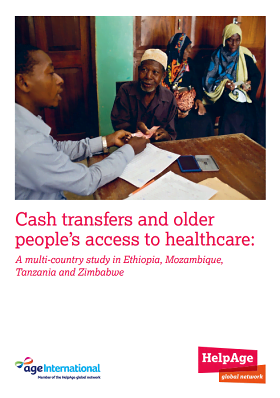
Cash Transfers and Older People’s Access to Healthcare: A Multi-Country Study in Ethiopia, Mozambique, Tanzania and Zimbabwe
Report
This report presents the findings of the Social Protection and Access to Health Services for Older People in Ethiopia, Mozambique, Tanzania and Zimbabwe study into the relationship between cash transfers and older people’s access to health services, carried out by Development Action on behalf of...

Cash for Health: Key learnings from a cash for health intervention in Jordan
Report
In Jordan, UNHCR and partners use cash as a part of a wider programme of referral services for refugees to access health care. Vulnerable pregnant refugee women are provided cash to pay for delivery. The value and targeting criteria for the transfer depend on the type of delivery medically indicated....

Is cash better than food vouchers for Syrian refugees?
Report
A comparative analysis of the effectiveness of unrestricted cash and food restricted voucher assistance modalities for Syrian refugee households’ food security in Jordan and Lebanon.
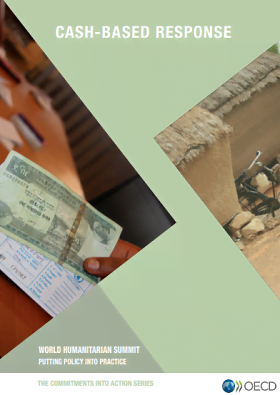
Cash-Based Response- OECD Commitments into Action Series
Report
The use of cash in humanitarian response is not new. What is new, notably after the World Humanitarian Summit and the Grand Bargain, is the policy momentum for using cash as a primary option in responding to humanitarian needs. There is a growing body of evidence demonstrating its multiple benefits as...

Monitoring for MPGs: Nigeria
Guidelines and Tools
DRC partnered with graduate students from the Fletcher School at Tufts University, to design three quantitative and qualitative monitoring tools to gauge the effect of MPGs at household and community levels (namely household survey, key informant interview and community group discussion templates). This...
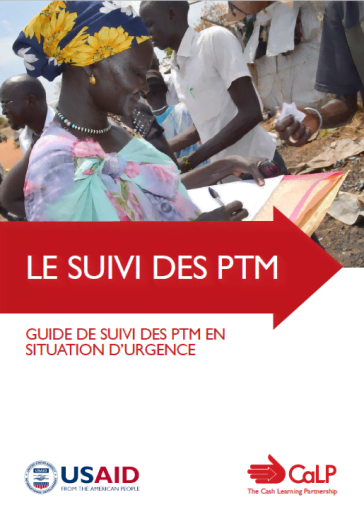
Le suivi des PTM : Guide de suivi des PTM en situation d’urgence
Guides et outils
Ce guide constitue une ressource centrale « évolutive « pour promouvoir une compréhension commune des considérations de suivi les plus importantes pour les projets humanitaires utilisant des programmes de transfert monétaire (PTM).
L’objectif du présent guide est d’aider les praticiens sur le...

Policy Briefing: Electronic Transfers in Humanitarian Assistance and Uptake of Financial Services
Report
The Electronic Cash Transfer Learning Action Network (ELAN) undertook case studies on humanitarian electronic transfer (‘e-transfer’) projects in Ethiopia, Zimbabwe and Bangladesh. The case studies examine the extent to which: recipients used digital financial services (e.g. money transfers, savings,...

Looking Back to Move Forward: Building on Learning from 2011 to Strengthen the 2017 Drought Response in Somalia Learning Report
Report
This report provides a summary of the discussions that took place during a half-day reflection workshop in May 2017. More than 40 people from national and international NGOs, the UN, donors and research organisations came together to consider lessons from the 2011 drought response, reflect on the use of...

The impact of cash transfers on resilience A multi-country study
Report
Provision of humanitarian aid in the form of cash transfers has gained significant momentum over the past few years. Research and evidence on certain aspects of cash transfer programmes (CTP) has been well documented, particularly regarding the efficiency and effectiveness of cash. It is also well...
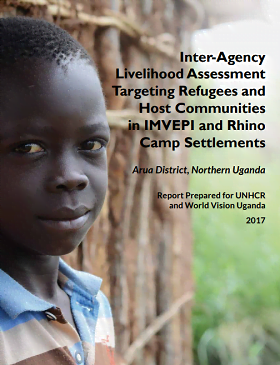
Inter-Agency Livelihood Assessment Targeting Refugees and Host Communities in IMVEPI and Rhino Camp Settlements Arua District, Northern Uganda
Case Study
This inter-agency needs assessment by World Vision Uganda (WVU), UNHCR and Caritas was conducted in two settlement areas of Rhino and Imvepi located in the West Nile Region of Uganda. The Imvepi settlement is the most recently opened area (February 2017) for resettlement and located about 72km east of the...

Cash Tranfers for Food Security in Epidemics. A Review of the USAID Food for Peace Response to the Ebola Crisis in Liberia and Sierra Leone
Case Study
Over the course of 2015 and 2016, the United States Agency for International Development/Food for Peace (USAID/FFP)-funded cash transfer programming (CTP) in Liberia and Sierra Leone reached over 500,000 crisis-affected people with a vital lifeline to tackle food insecurity. Monitoring data indicates that...

Monitoring for MPGs: Ethiopia
Guidelines and Tools
DRC partnered with graduate students from the Fletcher School at Tufts University, to design three quantitative and qualitative monitoring tools to gauge the effect of MPGs at household and community levels (namely household survey, key informant interview and community group discussion templates). This...

Counting Cash: Tracking Humanitarian Expenditure on Cash-Based Programming
Report
This working paper aims to begin filling the data gap by providing a baseline estimate on the volume and nature of cash-based programming in 2015. Most of the largest implementing agencies of cash and voucher programming have provided us with data on their organisational expenditure relating to...

Using Cash and Vouchers in Somalia in 2017: The Need to Build on Learning from the 2011-12 Somalia Drought Response
Report
During the 2011-12 drought response in Somalia, cash and vouchers were distributed at scale – a response that was unusual in such a context at that time. In 2017 cash is accepted as highly appropriate and is a major part of response plans. While it may not always be possible to apply all best...

From Grand Bargain to Beneficiary: An Analysis of Funding Flows Through the Humanitarian System
Report
The study undertook a financial analysis of a range of projects that received ECHO funding in order to answer the following questions listed in full in the terms of reference (Annex 1): How much donor money (net) gets to the beneficiary? What are the total costs of each stage in the chain? What is...

Shock-Responsive Social Protection Systems Research Case Study: Pakistan
Report
This case study presents an overview of the social protection disaster risk management and humanitarian systems in Pakistan, and discusses both Pakistan’s flagship social protection programme, the Benazir Income Support Programme (BISP), as well as emergency cash transfers provided as disaster...

Case Study: Education for South Sudanese Refugees in Ethiopia
Report
An education programme for South Sudanese refugees in Ethiopia illustrates the use of two complementary sets of standards: the Inter-Agency Network for Education in Emergencies (INEE)’s Minimum Standards for Education and Sphere Humanitarian Charter and Minimum Standards.
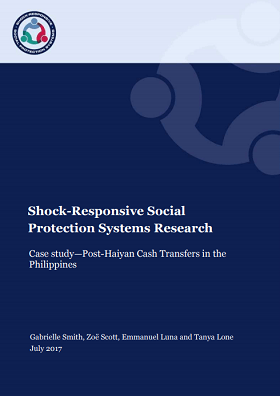
Shock-Responsive Social Protection Systems Research Case study—Post-Haiyan Cash Transfers in the Philippines
Report
This case study report focuses specifically on the experiences of using emergency cash transfers following Typhoon Haiyan and considers the wider social protection system, developments since Haiyan and future possibilities for shock-responsive social protection. A summary briefing note is published...
